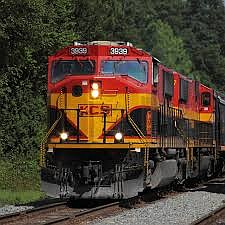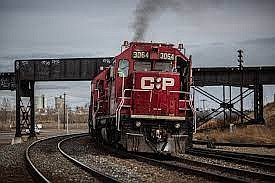Environmental Justice Concerns Loom Over Rail Merger
Environmental Justice Concerns Loom Over Rail Merger | 8/19/2022, 1:34 p.m.
A few months back, I wrote a column focused on my misgivings about the proposed merger of two huge railroads – Canadian Pacific and Kansas City Southern. As I wrote at the time, I feared that the merger would add to the environmental and health burdens already facing Black communities and other communities of color by introducing more rail traffic and more carbon emissions while also negatively impacting things like emergency response and commute times.
I hoped that my piece – along with the continued concerns raised by stakeholders throughout the merger’s regulatory review process – might raise some eyebrows within the U.S. Surface Transportation Board, the federal body charged with evaluating the merger’s merits. Environmental justice is no joke, after all. And aren’t the days of simply forcing communities of color to bear the brunt of the pollution caused by industry, shipping, refining, and other such activities behind us by now?
Unfortunately, it seems for the time being that my hopes for racial justice amid this railroad super-merger were misplaced. To understand the source of my disappointment, look no further than the location of the public hearings scheduled by the Surface Transportation Board.
In Texas, Harris County Precinct One is home to more than a million residents living in Houston and nearby unincorporated communities. It’s one of the most heavily populated communities on the route of the proposed merger between Canadian Pacific and Kansas City Southern, and also a handful of “non-attainment” areas along the route. Non-attainment areas are those deemed by the federal government to exceed allowable thresholds for certain environmental pollutants.
If approved, Precinct One residents would see about eight additional freight trains moving through their community every day. Those trains would bring in tow more than just freight. They’d also bring all the problems I articulated in my last piece: emissions, dirty air, delayed rail crossings, longer commutes, slower emergency response times, and more.
Precinct One is no stranger to dirty commerce. And while most would agree that a certain amount of pollution is unavoidable in an economy like ours, the fact of the matter is that this corner of Harris County has already carried more than its share of the weight associated with growth and gains in the broader economy.
Children living in neighborhoods along the merger’s route – which will follow existing Union Pacific rail lines – already suffer from a disproportionately high rate of asthma. And 24 percent of Black children in Harris County have asthma, according to a 2015 survey – more than double the rate for other demographic groups. Adding more trains to these already heavily trafficked routes – in a community that already hosts an elevated concentration of polluting industries and transit – will only exacerbate these serious health concerns.
To put a finer point on it, communities in Precinct One and across Houston have a genuine stake in the outcome of the merger review process. Their concerns aren’t invented, they aren’t trivial, and if the merger proceeds as is, they can’t be avoided. Why, then, has the Surface Transportation Board declined to hold a public hearing within the community? Hearings like these are commonplace, and while they may seem old fashioned, they represent the most direct and impactful way for a citizen or another stakeholder to state their case on issues that matter to their specific community.
To his credit, Precinct One County Commissioner Rodney Ellis has been vocal in his requests that the Surface Transportation Board host a hearing in his community. He’s also articulated requests intended to mitigate the impact of the merger if it is approved, from installing HEPA filters in schools to conducting multilingual outreach to communities with surface-level rail crossings so residents can anticipate and plan for longer commutes and other impacts.
Despite months of outreach from Commissioner Ellis, and despite the clear environmental justice concerns at play, the rail companies haven’t reached out to Ellis. And perhaps even more concerningly, the only public hearing that the federal regulator, the STB, announced would be held in Texas was scheduled for Vidor, Texas – a town that was notoriously almost completely white until recently – instead of Houston. Vidor is in particular a town with a notorious and disturbing history of so many overt issues with racism that it has been dubbed by some as “the most racist town in America.”
I believe in giving people the benefit of the doubt. I believe that most of us want to do the right thing. And I believe the people overseeing this process want the best for all involved.
But I also believe an error has been committed, and that the people of Houston and other towns with significant racial minority populations deserve a chance to say their piece when it comes to the merger. A public hearing may not resolve all of my concerns with the merger. But the absence of a public hearing will certainly make my concerns that much more pronounced. Especially when the location that is selected may not be friendly for people of color to testify at once the sun sets.





